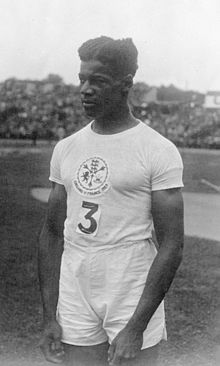Jack London (athlete)

Jack London in 1929
|
|
| Personal information | |
|---|---|
| Born | 13 January 1905 Georgetown, British Guiana |
| Died | 2 May 1966 (aged 58) London, Great Britain |
| Height | 1.83 m (6 ft 0 in) |
| Weight | 75 kg (165 lb) |
| Sport | |
| Sport | Athletics |
| Event(s) | 100 m, 200 m, high jump |
| Club | Polytechnic Harriers |
| Coached by | Sam Mussabini, Albert Hill |
| Achievements and titles | |
| Personal best(s) | 100 m – 10.6 (1928) 200 m – 22.2 (1928) HJ – 1.88 m (1927) |
|
Medal record
|
|
John Edward London (13 January 1905 – 2 May 1966) was a British athlete who competed mainly in the 100 metres. Born in British Guiana, now Guyana, he won a silver and a bronze medal at the 1928 Summer Olympics in Amsterdam, becoming the first black athlete to win Olympic medals for Great Britain.
London moved to London as a child and studied at the Regent Street Polytechnic, where he joined the Polytechnic Harriers and was coached by Sam Mussabini. He was elected captain of the sports club in October 1922. He was an early adopter of starting blocks rather than digging footholds in the cinder tracks. He ran the 100 metres in 10.7 seconds to win the race at a competition between England and France at Stamford Bridge in July 1927, and then won both the 100 metres and the 200 metres at a competition in Paris in October 1927.
London competed for Great Britain in the 1928 Summer Olympics held in Amsterdam, Netherlands. After equalling the Olympic 100 metres record of 10.6 seconds in the semi-final, he won the silver medal in the 100 metres final, behind Canadian Percy Williams. He then won the bronze medal in the 4×100 metres relay with his team mates Cyril Gill, Edward Smouha and Walter Rangeley, behind the teams of the USA and Germany. He was the first to use starting blocks at the Olympic Games. He was awarded the Polytechnic Harriers's S. A. Mussabini memorial medal (Mussabini having died in 1927) and the Studd Trophy in 1928.
He was later coached by Albert Hill. In July 1929, he became the first British sprinter to win the Amateur Athletic Association's 100 yards title since Harold Abrahams in 1924. He was also a leading British high jumper in this period. His athletic career was curtailed by a leg injury in 1930. He joined a 4×100 metre relay for England against Germany in 1931, but was not selected for the 1932 Summer Olympics in Los Angeles.
...
Wikipedia
